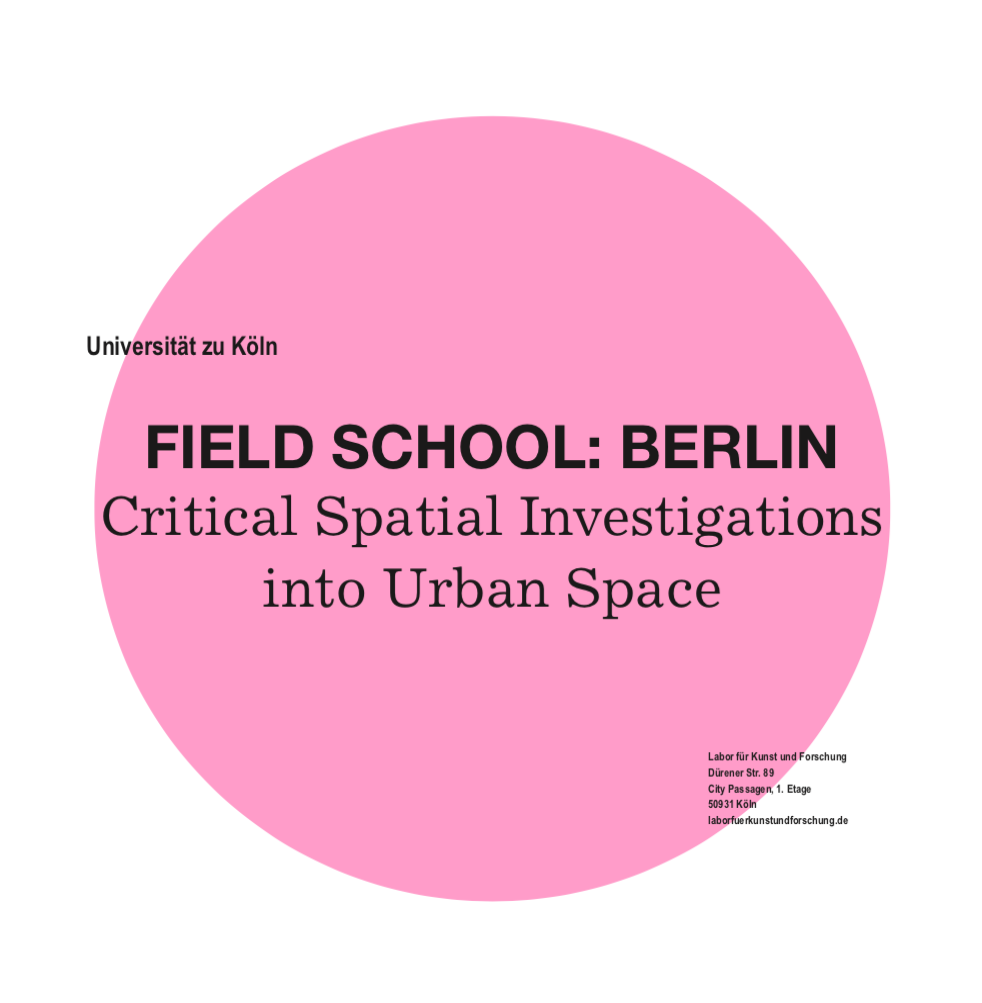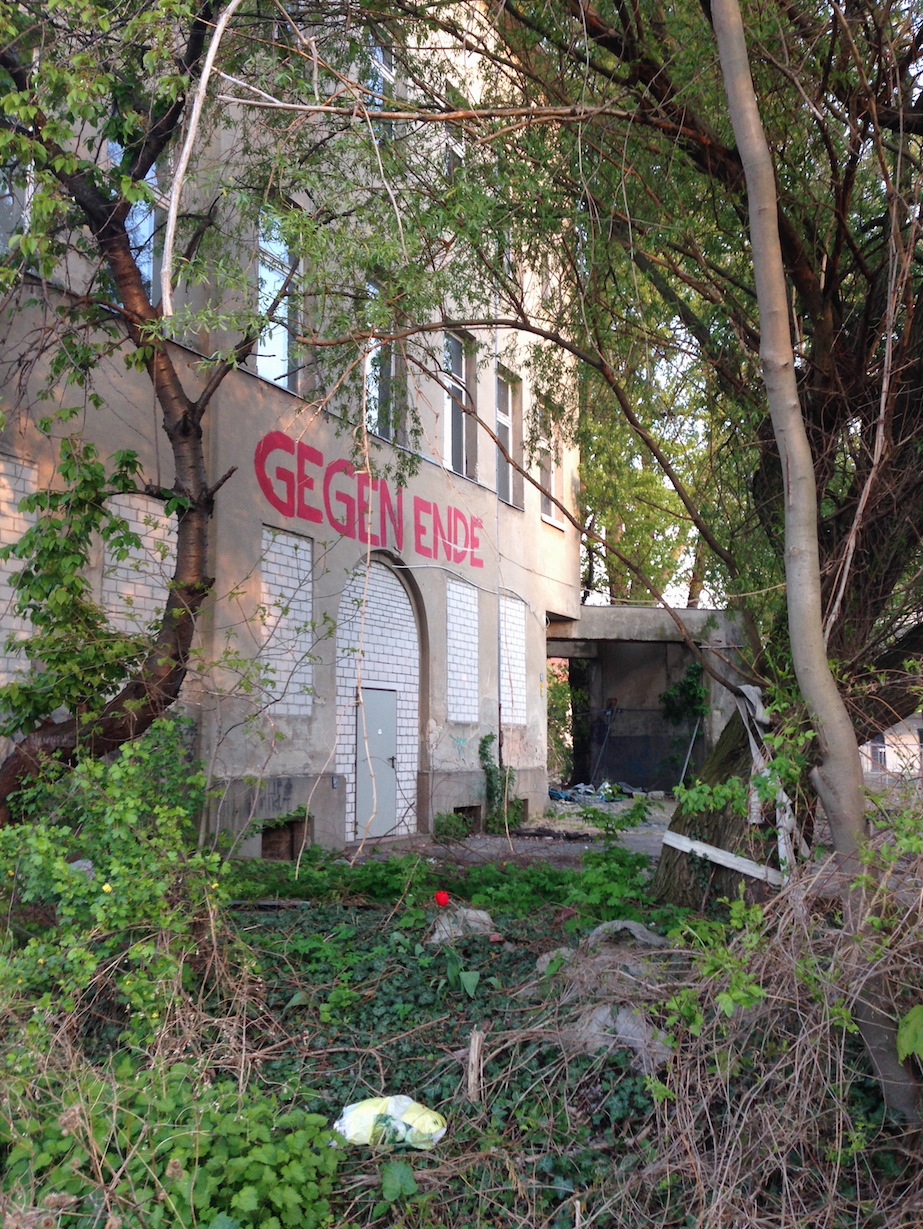Field School: Berlin – Critical Spatial Investigations into Urban Space

*** English version below ***
Critical Spatial Investigations into Urban Space | Workshops mit der Field School: Berlin
Field School: Berlin ist eine Kooperation des LABOR FÜR KUNST UND FORSCHUNG, Institut für Kunst und Kunsttheorie, Universität zu Köln mit dem OBSERVATIONAL PRACTICES LAB, Parsons,The New School, New York.
Als urbanes Forschungslabor ist die Field School: Berlin eine Plattform für Workshops, Vorträge und eine finale Ausstellung. Das interkulturelle Programm widmet sich der Erforschung und Neuverhandlung des städtischen Raums durch experimentelle Beobachtungsmethoden und künstlerische Forschungspraktiken. Teilnehmer*innen untersuchen die Stadt durch eine Vielzahl von Perspektiven: praktisch, theoretisch und forschend. Inspiriert durch Theorien des Alltags und Konzepte der Raumproduktion, konzentriert sich die Field School: Berlin auf die heterogene Erfahrung der städtischen Umwelt und untersucht die verschiedenen Faktoren, die sie hervorgebracht haben. Wie werden urbane Transformationsprozesse in der Architektur und im städtischem Raum sichtbar, vermittelt und dargestellt? Wie können gesellschaftspolitische Veränderungen und die Herstellung von Raum künstlerisch erforscht, dargestellt und verhandelt werden? Welche direkten und indirekten Auswirkungen haben digitale Technologien auf die Stadt? Wie verändern sich soziale und urbane Gefüge und was sind die sichtbaren Anzeichen für diese Verschiebung? Field School: Berlin untersucht ortsspezifische Momente des urbanen Wandels, die sich in der Architektur, den Stadtteilen und dem Alltagsleben der Stadt zeigen.
16.12.2019, 18:00 Uhr
Diana Lucas-Drogan
„Being Involved“
Performative Counter-Mapping Praxen als Formen der sozialen und politischen Handlung im Raum und somit auch als Werkzeug der Emanzipation in der Aufzeichnung und Architektur werden anhand von drei Beispielen aus den eigenen kollaborativen Arbeiten vorgestellt. Wir spazieren von Hellersdorf über Whats-App nach Brandenburg in das österreichische Mürzzuschlag. Der Vortrag legt einen Fokus auf die Herangehensweisen und Taktiken, die als Grundlage für ein Counter-Mapping entwickelt werden. Hierbei wird untersucht in welche Repräsentation diese überführt werden und welche Wirkung sie entfalten.
Diana Lucas-Drogan ist freischaffende Künstlerin und Architektin und arbeitet als Lehrende am GTAS Braunschweig bei Prof. Tatjana Schneider und der Technischen Universität Berlin. Ihr Schwerpunkt liegt in der qualitativen Raumforschung verbunden mit der performativen Counter-Mapping Praxis und der Produktion von Raum. Sie ist Mitglied des Vereins metroZones, Zentrum für städtische Angelegenheiten in Berlin.
www.dianalucasdrogan.com
17.12.2019, 18:00 Uhr
Maya Schweizer
„Exercises in Style“
Die bildende Künstlerin Maya Schweizer beschäftigt sich in ihrer Arbeit mit dem Verhältnis von persönlicher und sozialer Geschichte. Dem urbanen Raum als Schnittstelle zwischen individuellem und kollektivem Handeln gilt daher ihr Hauptinteresse. In ihren Filmen, Zeichnungen, Fotografien und Collagen untersucht sie, welche Rolle unsere mentalen Bilder spielen, um das zu rekonstruieren, was wir nicht direkt wissen. Darin erfasst sie Situationen, oder besser gesagt Fragmente von suggestiven Situationen, in denen die Lücken zwischen Bild und Text oder das Auseinanderdriften zwischen visueller und narrativer Ebene eine Fiktion erzeugen.
Maya Schweizer, geboren in Paris, studierte Kunst und Kunstgeschichte an der Universität Aix-en-Provence. Sie zog 1998 nach Deutschland und studierte an der Hochschule für Grafik und Buchkunst in Leipzig (HGB) (1999-2002) und zog 2003 nach Berlin, wo sie ihr Studium an der Universität der Künste (UdK) bei Professor Lothar Baumgarten beendete und 2006 abschloss.
www.mayaschweizer.com
18.12.2019, 18:00 Uhr
Folke Köbberling
„Full Stop“
Die Künstlerin Folke Köbberling entwickelt Interventionsmodelle für den urbanen Raum, wo sie vorhandene Strukturen umnutzt und so den gewohnten Umgang mit städtischer Architektur auf subtile, oft humorvolle Weise in Frage stellt. Konzepte von gemeinschaftlichem Zusammenleben werden dabei ebenso befragt wie kapitalistisch bestimmte städtische Strukturen des Wohnens, Arbeitens und der Mobilität.
Folke Köbberling hat viele Jahre mit Martin Kaltwasser zusammengearbeitet. Sie hat an zahlreichen internationalen Einzel- und Gruppenausstellungen teilgenommen: u.a. Martin Gropius Bau/Berlin, Haus der Kulturen der Welt, ZKM Karlsruhe, Lentos Museum, Ruhrtriennale 2012. Einzelausstellungen: Jack Hanley Gallery, NYC, Schaustelle der Pinakothek der Moderne in München, Kunstverein Kassel, Museo El Eco /Mexiko City (2017). Sie ist Professorin an der TU Braunschweig und leitet das Institut für Architekturbezogene Kunst.
www.folkekoebberling.de
21.12.2019, 18:00 Uhr
Project Presentations
Field School: Berlin
In einer archivarischen Herangehensweise zeigen die Projektpräsentationen digitale und physische Artefakte, die den Forschungsprozess von Studierenden aus Köln und New York materialisieren. Initiiert in Workshops mit Folke Köbberling, Diana Lucas-Drogan und Maya Schweizer, entwickelten die Studierenden individuelle Forschungsfragen zur Untersuchung der sich verändernden urbanen Räume.
The Field School: Berlin wird vom International Office der Universität zu Köln im Rahmen der COLOGNE SUMMER SCHOOLS unterstützt.
*** English version***
Critical Spatial Investigations into Urban Space | Workshops with Field School: Berlin
A collaboration between the LABORATORY FOR ART AND RESEARCH, Institute for Art and Art Theory, University of Cologne and the OBSERVATIONAL PRACTICES LAB, Parsons / The New School, New York.
Field School: Berlin is an urban laboratory for research-based learning, and platform for workshops, lectures and a culminating exhibition. Dedicated to the exploration and renegotiation of urban space through experimental methods of observation and artistic research practices, this intercultural program engages the city from a multiplicity of perspectives: practical, theoretical, and investigative. Drawing from theories of the everyday and concepts of spatial production Field School: Berlin focuses on the heterogeneous experience of the urban environment and explores the various factors that have produced it. How are the processes of urban transformation made visible, mediated and represented through architecture and built environments? How can socio-political changes and the production of space be explored, represented and negotiated in the field of art? What are the direct and indirect effects of digital technologies on the city? How are particular social and urban structures changing, and what are the visible indications of this shift? Field School: Berlin examines site-specific moments of urban change as it is expressed in the architecture, neighborhoods and everyday life of the city.
16.12.2019, 6pm
Diana Lucas-Drogan
„Being Involved“
Based on three of her collaborative projects, Diana Lucas-Drogan will introduce Performative Counter-Mapping Practices as a form of social and political action and as a tool of emancipatory documentation of space and architecture. We will be strolling from Hellersdorf via Whats-App to Brandenburg in the Austrian Mürzzuschlag. The lecture focuses on the approaches and tactics that are developed as a basis for counter-mapping. It examines the translation into representations and unfolding effects.
Diana Lucas-Drogan is a freelance artist and architect. She is a lecturer at the GTAS Braunschweig with Prof. Tatjana Schneider, and at Technische Universität Berlin. Her focus is on qualitative spatial research combined with performative counter-mapping practice and the production of space. She is a member of the association metroZones, Center for Urban Affairs in Berlin.
www.dianalucasdrogan.com
17.12. 2019, 6pm
Maya Schweizer
„Exercises in Style“
Maya Schweizer explores the relationship between personal and social history in her work. Urban space — as an interface between individual and collective actions — is the focus of her interest. In her films, drawings, photographs and collages, she explores the role of mental images in reconstructing what we do not know directly. In this work, she captures situations, or rather fragments of suggestive situations, in which the gaps between image and text — or the drifting between visual and narrative level — create a fiction.
Maya Schweizer, born in Paris, studied art and art history at the University of Aix-en-Provence. She moved to Germany in 1998 and studied at the Academy of Visual Arts in Leipzig (HGB) (1999-2002) and moved to Berlin in 2003, where she finished her studies at the University of the Arts (UdK) with Professor Lothar Baumgarten. She graduated in 2006.
www. mayaschweizer.com
18.12. 2019, 6pm
Folke Köbberling
„Full Stop“
Folke Köbberling develops models of intervention in urban space, where she uses existing structures to question learned interactions with urban architecture in subtle, often humorous ways. Her inquiry addresses both concepts of communal living and capitalistically determined urban structures of living, working and mobility.
Folke Köbberling has worked with Martin Kaltwasser for many years. She has participated in numerous international solo and group exhibitions including Martin Gropius Bau / Berlin, House of World Cultures, ZKM Karlsruhe, Lentos Museum, Ruhrtriennale 2012. Solo exhibitions: Jack Hanley Gallery, NYC, showroom of the Pinakothek der Moderne in Munich, Kunstverein Kassel, Museo El Eco / Mexico City (2017). She is a professor at TU Braunschweig and leads the Institute for Architecture-related Art. www.folkekoebberling.de
21.12.2019, 6pm
Project Presentations
Field School: Berlin
In an archival approach, the project presentations display digital and physical artifacts materializing in-process research of students from Cologne and New York. Initiated during workshops with Folke Köbberling, Diana Lucas-Drogan and Maya Schweizer, students developed individual research inquiries to explore shifting urban environments.
The Field School: Berlin is supported by the International Office of the University of Cologne as part of COLOGNE SUMMER SCHOOLS.

Fotocredit: Jeff Luckey


